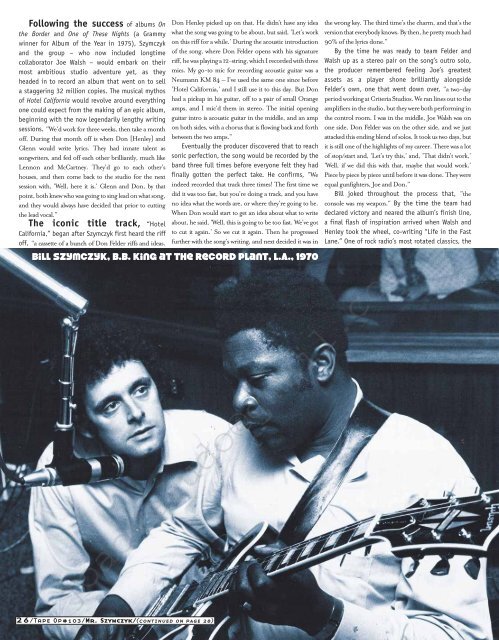Create successful ePaper yourself
Turn your PDF publications into a flip-book with our unique Google optimized e-Paper software.
Following the success of albums On<br />
the Border and One of These Nights (a Grammy<br />
winner for Album of the Year in 1975), Szymczyk<br />
and the group – who now included longtime<br />
collaborator Joe Walsh – would embark on their<br />
most ambitious studio adventure yet, as they<br />
headed in to record an album that went on to sell<br />
a staggering 32 million copies. The musical mythos<br />
of Hotel California would revolve around everything<br />
one could expect from the making of an epic album,<br />
beginning with the now legendarily lengthy writing<br />
sessions. “We’d work for three weeks, then take a month<br />
off. During that month off is when Don [Henley] and<br />
Glenn would write lyrics. They had innate talent as<br />
songwriters, and fed off each other brilliantly, much like<br />
Lennon and McCartney. They’d go to each other’s<br />
houses, and then <strong>com</strong>e back to the studio for the next<br />
session with, ‘Well, here it is.’ Glenn and Don, by that<br />
point, both knew who was going to sing lead on what song,<br />
and they would always have decided that prior to cutting<br />
the lead vocal.”<br />
The iconic title track, “Hotel<br />
California,” began after Szymczyk first heard the riff<br />
off, “a cassette of a bunch of Don Felder riffs and ideas.<br />
Don Henley picked up on that. He didn’t have any idea<br />
what the song was going to be about, but said, ‘Let’s work<br />
on this riff for a while.’ During the acoustic introduction<br />
of the song, where Don Felder opens with his signature<br />
riff, he was playing a 12-string, which I recorded with three<br />
mics. My go-to mic for recording acoustic guitar was a<br />
Neumann KM 84 – I’ve used the same one since before<br />
‘Hotel California,’ and I still use it to this day. But Don<br />
had a pickup in his guitar, off to a pair of small Orange<br />
amps, and I mic’d them in stereo. The initial opening<br />
guitar intro is acoustic guitar in the middle, and an amp<br />
on both sides, with a chorus that is flowing back and forth<br />
between the two amps.”<br />
Eventually the producer discovered that to reach<br />
sonic perfection, the song would be recorded by the<br />
band three full times before everyone felt they had<br />
finally gotten the perfect take. He confirms, “We<br />
indeed recorded that track three times! The first time we<br />
did it was too fast, but you’re doing a track, and you have<br />
no idea what the words are, or where they’re going to be.<br />
When Don would start to get an idea about what to write<br />
about, he said, ‘Well, this is going to be too fast. We’ve got<br />
to cut it again.’ So we cut it again. Then he progressed<br />
further with the song’s writing, and next decided it was in<br />
Bill Szymczyk, B.B. King at The Record Plant, L.A., 1970<br />
26/Tape Op#103/Mr. Szymczyk/(continued on page 28)<br />
the wrong key. The third time’s the charm, and that’s the<br />
version that everybody knows. By then, he pretty much had<br />
90% of the lyrics done.”<br />
By the time he was ready to team Felder and<br />
Walsh up as a stereo pair on the song’s outro solo,<br />
the producer remembered feeling Joe’s greatest<br />
assets as a player shone brilliantly alongside<br />
Felder’s own, one that went down over, “a two-day<br />
period working at Criteria Studios. We ran lines out to the<br />
amplifiers in the studio, but they were both performing in<br />
the control room. I was in the middle, Joe Walsh was on<br />
one side, Don Felder was on the other side, and we just<br />
attacked this ending blend of solos. It took us two days, but<br />
it is still one of the highlights of my career. There was a lot<br />
of stop/start and, ‘Let’s try this,’ and, ‘That didn’t work,’<br />
‘Well, if we did this with that, maybe that would work.’<br />
Piece by piece by piece until before it was done. They were<br />
equal gunfighters, Joe and Don.”<br />
Bill joked throughout the process that, “the<br />
console was my weapon.” By the time the team had<br />
declared victory and neared the album’s finish line,<br />
a final flash of inspiration arrived when Walsh and<br />
Henley took the wheel, co-writing “Life in the Fast<br />
Lane.” One of rock radio’s most rotated classics, the<br />
<strong>joaoveludo@gmail</strong>.<strong>com</strong>



